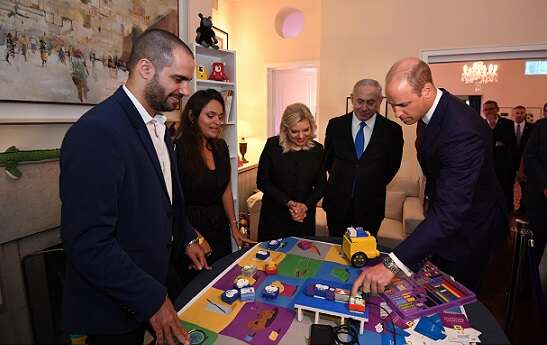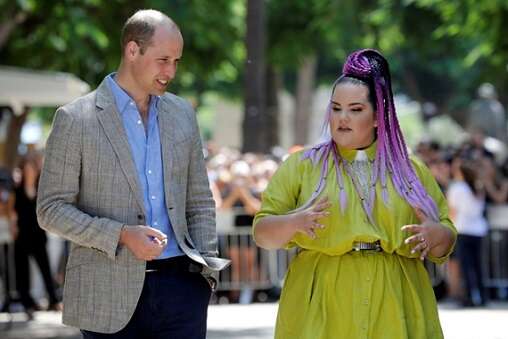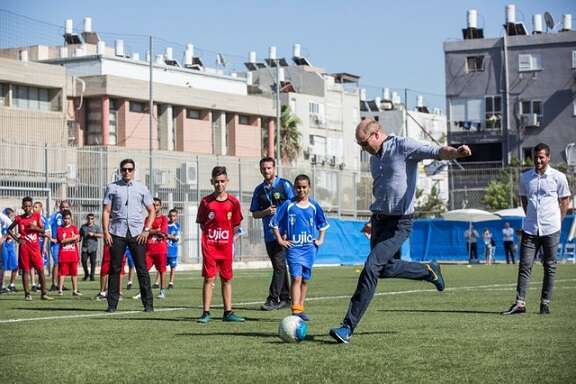Prince William envisioned a strong future for Israel while making the first official British royal visit to the country on Tuesday and pledged to commemorate the Holocaust that contributed to its foundation.
Speaking at a reception in his honor at the British Ambassador's Residence in Ramat Gan, William said his visit earlier to Israel's Yad Vashem Holocaust memorial and museum in Jerusalem had been a "profoundly moving experience."
He told dignitaries, including Prime Minister Benjamin Netanyahu, that he was "well aware that the responsibility falls now to my generation to keep the memory alive of that great crime as the Holocaust generation passes on, and I commit myself to doing this."
After a brief opening greeting in Hebrew, William said, "Israel's remarkable story is partly one of remembering its terrible past but also looking forward to a much more hopeful future … the modern story is one of inventing, creating, innovating and striding confidently into its future."
While at the ambassador's residence, William joined Netanyahu and his wife Sara in viewing an exhibit on the technological developments of four Israeli companies.

Earlier in Jerusalem, he met Netanyahu and President Reuven Rivlin.
Following his engagements in Jerusalem, William went to Tel Aviv where he was met by the city's mayor, Ron Huldai. Sporting sunglasses and an open-necked shirt, the Duke of Cambridge strolled along the Mediterranean shore, chatting with beach-goers and quipping, "I should have brought my swimming trunks." Together, William and Huldai watched a beach volleyball game and checked out a lifeguard station.
On Wednesday, William strolled Tel Aviv's Rothschild Boulevard with 2018 Eurovision winner Netta Barzilai.
William's trip is at the behest of the British government. Until now it had been British policy not to make an official royal visit until the Israeli-Palestinian conflict was resolved. British officials have given no detailed explanation for the change in policy.
At Yad Vashem, the prince spoke with two men who survived the Nazi genocide through British intervention.
Henry Foner, 86, and Paul Alexander, 80, were among the thousands of Jewish children taken in by Britain from a continental Europe that was falling to German conquest as part of the 1930s "Kindertransport."
"I said to His Royal Highness that this is a unique opportunity for me to express my thanks to the British people for opening their homes to me and to the other 10,000 children who came," Alexander said.
Foner described the prince as very warm and said he "gave us a good feeling." Foner said he thanked William, as a representative of the British people, for saving me at that time." He said talking to the prince was "like talking to a friend I haven't seen in a long time."
Wearing a black kippah, William laid a wreath at the Hall of Remembrance, where an eternal flame flickers and the names of extermination and concentration camps are engraved in the floor.
"Terrifying," William said, viewing a display at the memorial's museum of shoes taken by the Nazis from Jews at the Majdanek death camp. "(I'm) trying to comprehend the scale."
Tens of thousands of Jews and other victims were killed at the camp, near Lublin in what is now Poland.
In the Yad Vashem guestbook, William wrote, "It has been a profoundly moving experience to visit Yad Vashem today. It is almost impossible to comprehend this appalling event in history. Every name, photograph and memory recorded here is a tragic reminder of the loss suffered by the Jewish people. The story of the Holocaust is one of darkness and despair, questioning humanity itself."
"We must never forget the Holocaust – the murder of 6 million men, women and children, simply because they were Jewish. We all have a responsibility to remember and to teach future generations about the horrors of the past so that they can never reoccur. May the millions of Jewish people remembered by Yad Vashem never be forgotten.
"The actions of those few, who took great risks to help others, are a reminder of the human capacity for love and hope. I am honored that my own great-grandmother is one of these Righteous Among the Nations."
After the tour, the prince – second in line to the British throne – was greeted by the Netanyahus at the Prime Minister's Residence against the backdrop of British and Israeli flags.
There, the prince met relatives of the late Rachel Cohen, who was hidden from the Gestapo along with two of her five children by Princess Alice, the mother of Britain's 97-year-old Prince Philip, in her palace in Greece.
The Greek royal family – Princess Alice was married to Prince Andrew of Greece – had been acquainted with Cohen's late husband, Haimaki, a former member of Greece's parliament.
"You must be very proud of your great-grandmother, who saved defenseless Jews," Netanyahu told William and gifted him a replica Righteous Among the Nations Certificate for Princess Alice, who was granted the title in 1993.
Princess Alice was recognized as one of the Righteous Among the Nations, gentiles who rescued Jews, by Yad Vashem in 1993.
A devout Christian, she is buried on the slopes of Jerusalem's Mount of Olives. William is due to visit her tomb on Thursday.
Netanyahu said, "We talked about a lot of things … our military service, helicopters, soccer, the World Cup. … I told him he must be very proud of his great-grandmother who saved defenseless Jews. And as prime minister, I am very proud the Jews are no longer defenseless. We have, thank God, a military to defend ourselves by ourselves."

At a meeting with Rivlin, the prince, on a visit described by Britain as nonpolitical, said he hoped "peace in the area can be achieved."
"I had a very moving tour around Yad Vashem this morning, which really taught me quite a lot more than I thought I already knew about the true horrors of what happened to the Jews over the war," William said at the meeting with Rivlin.
At the President's Residence, Rivlin told William, "This land knows a lot about history, today you are writing a new page in history. Many kings and princes have visited Jerusalem over the years, and you come not just as a prince but as a pilgrim to the Holy Land."
Rivlin spoke with William of his experience growing up in Jerusalem.
"Your Royal Highness, I was born as a British subject. I walked to school every day down King George Street, but also past King David Street. We were here 100 years even before the Balfour Declaration, a declaration which helped the people of Israel, the Jewish people, from all around the world bring to reality the idea and the belief that the Jewish people have to return to their homeland."
He told William, "We really appreciate the connection and the cooperation between our two states; the cooperation, the trade between us, and the friendship."
The president went on to note that William was to meet with Palestinian Authority President Mahmoud Abbas in Ramallah on Wednesday, and asked that the prince convey a "message of peace."
"It is about time that we have to find together the way to build confidence as a first step to bringing an end to the tragedy between us that has gone one for more than 100 years," Rivlin said.
William thanked Rivlin for his words and warm welcome. He said, "It is my first visit to Israel, and I am obviously looking forward to getting to meet as many Israelis as possible and understanding Israeli history and Israeli culture over the next few days."
Rivlin presented William a copy of an album of pictures taken between 1850 and 1865 of Prince Albert Edward – who went on to be King Edward VII – Prince William's great-great-great-grandfather, who visited the Holy Land in 1862. The album included an article by Rivlin's great-grandfather Yosef describing the prince's welcome.

In return, William gifted Rivlin, who is a fan of the Liverpool soccer team, a team jersey signed by former captain Steven Gerrard.



